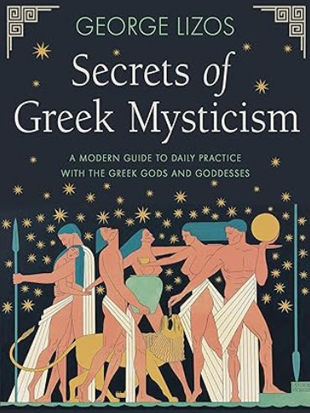We weren’t sure what to make of this book at first. Greek gods and goddesses are the subject of interesting mythology and part of the literature canon, but are they a foundation for spiritual practice? George Lizos says yes, and he’s making that happen today.
In 2017, he completed the first official priesthood training in Hellenic Polytheism organized by the Supreme Council of Ethnic Hellenes in Athens. This came after the religion’s legal recognition by the Greek government. That religion is known as Greek Paganism, and so now Greek Pagans are allowed to purchase land in Greece, create houses of worship, and their clergy may perform wedding ceremonies. Lizos works as a priest at a modern temple of Zeus in Cyprus.
He embraces Greek Polytheism as “the indigenous, pagan religion of the ancient Greeks.” He rejects the idea that the gods and goddesses were myths that people never took seriously.
Most of all, Lizos excels at ritual and how to use rituals in daily life. For instance, he has interesting sections on altars — how to use them, and why, and how to connect with the essences of Greek gods and goddesses in many other ways as well. He always turns to the practical and the useful. For instance, how to identify your guardian god or goddess, chapter 21, will appeal to many readers, as will new moon rituals (chapter 25) and full moon rituals (chapter 26).
Part Two, “Getting to Know the Gods,” sounds at first like another chronicling of the stories of Zeus, Hera, Poseidon, Apollo, etc., but Lizos exposes mistakes and problems in the mythological tellings and offers their stories instead as living sources of ritual and meaning.
For example, in the chapter on Athena, the goddess of wisdom and warfare, he includes a section on her virtues: “fortitude,” and “quickness of mind.” This is followed by a section called “Ascending with Athena” involving spiritual practices that “will help you align with Athena’s qualities and embody her essence.” These include a mantra, journal prompts, nature walks, hymns, physical symbols, and a five-step “activation meditation.” Similar sections appear in each chapter on the individual gods and goddesses.
Many of the “activation meditations” include visualization techniques that are alchemical in their advice and purpose. (See the spiritual practice below for an example.)
